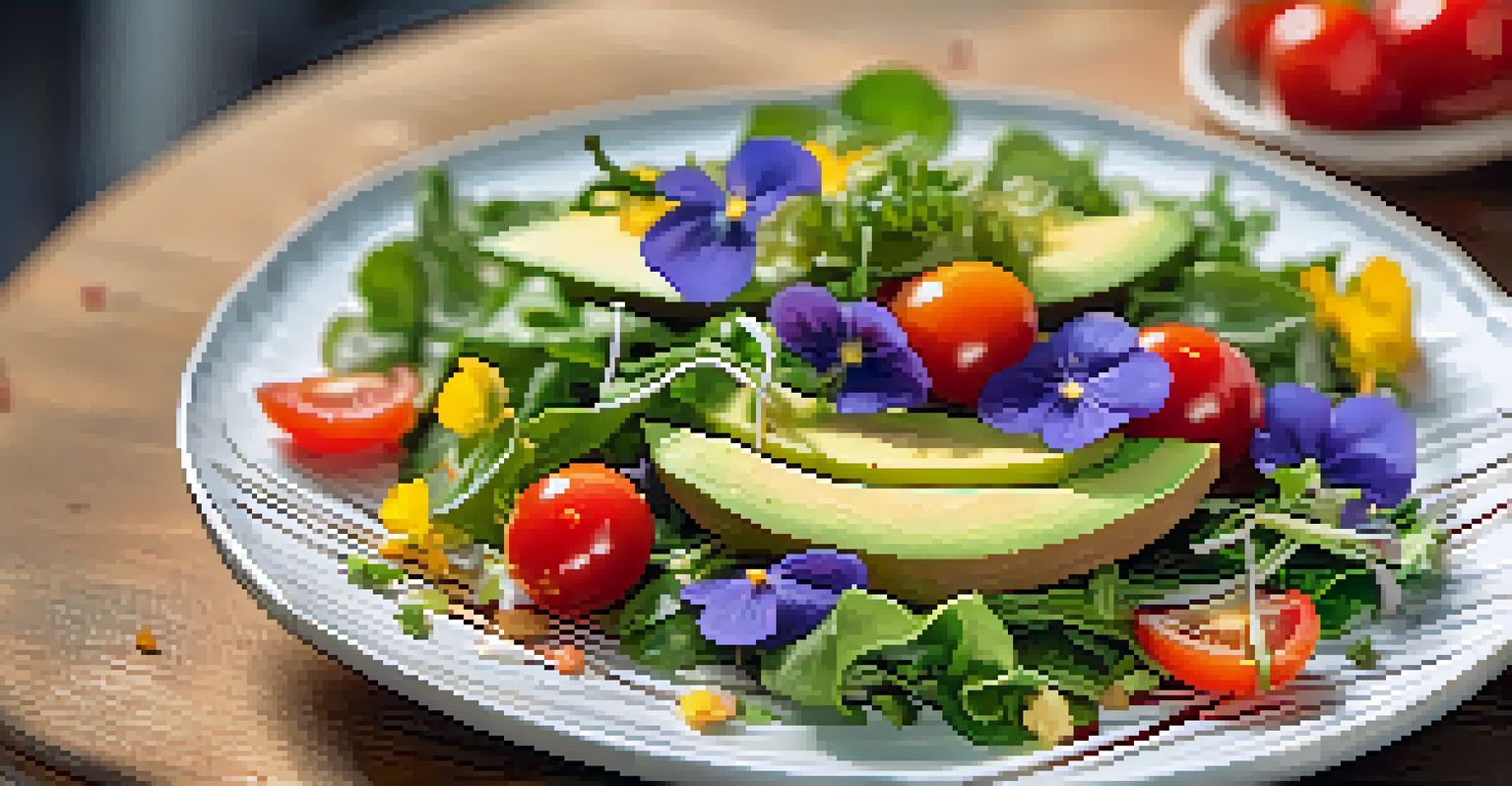Cognitive Dissonance in Raw Food Diet Adoption

What is Cognitive Dissonance and Why It Matters
Cognitive dissonance is a psychological concept that occurs when a person's beliefs clash with their actions. For instance, if someone believes in eating healthy but often indulges in junk food, this inconsistency can create discomfort. Understanding cognitive dissonance can be key to making lifestyle changes, such as adopting a raw food diet. This discomfort serves as a motivator for change, pushing individuals to align their actions with their beliefs.
Change is hard at first, messy in the middle, and gorgeous at the end.
In the context of dietary choices, cognitive dissonance plays a significant role. A person may want to eat raw foods for health benefits but struggles with cravings for cooked meals. This internal conflict can lead to a range of emotions, including guilt and frustration. Acknowledging these feelings is the first step toward reconciling one's diet with their health values.
Ultimately, recognizing cognitive dissonance allows individuals to navigate their food choices more consciously. By addressing the discomfort head-on, they can make informed decisions that align with their health goals. This process not only promotes a healthier lifestyle but also fosters a deeper understanding of personal values.
The Raw Food Diet: A Brief Overview
The raw food diet consists primarily of unprocessed, uncooked plant-based foods. This approach emphasizes fruits, vegetables, nuts, seeds, and sprouted grains, all valued for their nutritional benefits. Proponents argue that raw foods retain more vitamins and enzymes, which can be lost during cooking. However, making the switch to a raw food diet can be challenging due to existing habits and preferences.

Many people are drawn to raw food for its potential health benefits, but the transition isn't always smooth. This is where cognitive dissonance often comes into play. Individuals may feel torn between their desire for a healthier lifestyle and their enjoyment of cooked meals. This conflict can create a sense of unease, prompting them to reflect on their choices.
Understanding Cognitive Dissonance
Cognitive dissonance arises when beliefs conflict with actions, motivating individuals to align their behaviors with their health values.
Understanding the raw food diet and its implications can help alleviate some of this dissonance. By educating themselves about the benefits and challenges, individuals can better navigate their feelings. This knowledge empowers them to make choices that resonate with their health intentions.
Common Sources of Cognitive Dissonance in Diet
Adopting a raw food diet often brings various sources of cognitive dissonance. For example, cultural traditions and social gatherings often revolve around cooked foods. When someone embraces a raw diet, they may feel isolated or judged during these occasions, which can amplify their internal conflict. This sense of disconnection can lead to feelings of guilt for not participating in shared meals.
The greatest discovery of my generation is that a human being can alter his life by altering his attitudes.
Another common source of dissonance is the allure of convenience. Raw foods require preparation and planning, which can be overwhelming for those used to fast food and quick meals. This struggle can create a tug-of-war between the desire for convenience and the commitment to health. As a result, individuals may find themselves questioning their choices and battling cravings.
Navigating these challenges is crucial for a successful transition to a raw food diet. Acknowledging these dissonant feelings allows individuals to address them constructively. By finding balance and seeking support, they can reduce the discomfort and embrace their dietary changes more fully.
Strategies to Alleviate Cognitive Dissonance
To successfully adopt a raw food diet, individuals can employ several strategies to ease cognitive dissonance. One effective approach is to gradually incorporate raw foods into their meals rather than making an abrupt change. This gradual transition can help minimize feelings of deprivation and make the experience more enjoyable. By slowly introducing raw foods, individuals can also discover new flavors and textures.
Another helpful strategy is to seek out support from like-minded individuals or communities. Connecting with others who share similar dietary goals can provide motivation and encouragement. These communities often share recipes, tips, and experiences that can help alleviate feelings of isolation. Having a support network can make the transition less daunting and more rewarding.
Challenges of Raw Food Diet
Transitioning to a raw food diet often brings internal conflict due to habitual preferences and social pressures surrounding cooked foods.
Finally, staying informed about the benefits of raw foods can reinforce commitment. Understanding the positive impacts of this diet on health can help individuals embrace their choices and reduce dissonance. Knowledge empowers them to stay focused on their goals and celebrate progress, making the journey to a raw food diet more fulfilling.
Mindfulness and Its Role in Dietary Choices
Mindfulness can significantly impact how individuals experience cognitive dissonance in their diets. By practicing mindfulness, individuals become more aware of their thoughts and feelings related to food choices. This heightened awareness can help them identify moments of dissonance and understand the underlying reasons for their cravings or conflicts. Mindfulness encourages a non-judgmental approach to these feelings, promoting self-compassion.
Incorporating mindfulness techniques, such as meditation or journaling, can aid in processing emotions surrounding dietary changes. For example, reflecting on why one desires cooked foods over raw options can provide valuable insights. This self-reflection can help individuals connect their cravings to deeper emotional needs, allowing for healthier coping mechanisms.
Ultimately, mindfulness fosters a positive relationship with food. By focusing on the present moment and cultivating an attitude of acceptance, individuals can reduce the impact of cognitive dissonance on their raw food journey. This approach encourages a sense of freedom and joy in their dietary choices.
Long-Term Benefits of Addressing Cognitive Dissonance
Addressing cognitive dissonance in adopting a raw food diet can lead to long-term benefits for both physical and mental health. By working through the internal conflicts, individuals often find greater satisfaction in their dietary choices. This resolution can enhance their overall well-being, making them feel more aligned with their values. As they embrace a healthier lifestyle, they may also experience increased energy and vitality.
Moreover, overcoming cognitive dissonance can foster personal growth and resilience. The process of confronting and resolving these inner conflicts can build stronger decision-making skills. Individuals learn to navigate challenges more effectively, which can extend beyond dietary choices to other areas of life. This newfound strength can empower them to face future challenges with confidence.
Mindfulness Enhances Dietary Choices
Practicing mindfulness helps individuals navigate cognitive dissonance by fostering awareness and acceptance of their food-related thoughts and feelings.
In the long run, addressing cognitive dissonance can transform one's relationship with food and health. It encourages a shift from a restrictive mindset to one of abundance and exploration. This change not only benefits the individual but can also influence those around them, inspiring others to consider healthier choices.
Conclusion: Embracing Change in Dietary Habits
Cognitive dissonance plays a pivotal role in the journey of adopting a raw food diet. By understanding and addressing this internal conflict, individuals can navigate their choices with clarity and purpose. Embracing a raw food lifestyle offers numerous health benefits, but it also requires a commitment to self-reflection and growth. Recognizing dissonance as a natural part of this process can help individuals feel more at ease with their decisions.
As individuals learn to reconcile their beliefs with their actions, they can cultivate a more fulfilling relationship with food. This journey encourages exploration and openness to new experiences. Whether it’s discovering new recipes or connecting with fellow raw food enthusiasts, the adventure can be incredibly rewarding.

Ultimately, embracing change in dietary habits is about finding balance and joy in the choices we make. By addressing cognitive dissonance, individuals pave the way for a healthier, more aligned lifestyle that resonates with their values and aspirations.